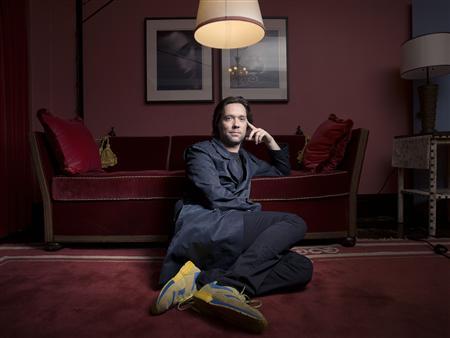(Reuters) – After writing an opera, recreating Judy Garland’s classic Carnegie Hall show and performing one
concert tour dressed, in his words, as a crazed feathered ghost, Rufus Wainwright is edging toward pop’s
mainstream.

a portrait in New York April 13, 2012.REUTERS/Victoria Will
The experimental singer-songwriter has teamed with popular British DJ and music producer
Mark Ronson, who helped create Amy Winehouse’s “Back to Black,” for what is being touted as Wainwright’s most commercial
album yet, “Out of the Game,” released in the United States on Tuesday.
“I definitely have the intention of creating
something slightly more commercially viable than opera for this next album,” Wainwright told Reuters, poking fun at his
production, “Prima Donna,” as well as his piano album “Songs for Lulu” – the record he performed on tour in a 17-foot-long
feathered cape.
And before those CDs came his first live album based on his interpretation of Garland’s famous, 1961
Carnegie Hall concert.
Wainwright’s mix of styles has been applauded by many critics and earned him a Grammy
nomination. Yet, despite having fans worldwide and being labeled as one of his generation’s top songwriters, some of his
albums haven’t sold very well.
“I was pretty on the margins of what is usually accepted by the mainstream, and I
felt, ‘Let’s try the mainstream. We tried this other stuff, so let’s try this,'” he said.
So far, his
collaboration with Ronson, whom the eclectic singer called “the consummate producer,” has worked. “Out of the Game” debuted
at No. 5 in Britain after its release a week ago.
But longtime fans of Wainwright, whose father is singer-songwriter
Loudon Wainwright III and who grew up with his folk singer mother, Kate McGarrigle, in Montreal, need not despair that this
new album will be unrecognizable, the singer said.
“It does have that intention, but I don’t think I necessarily
threw the baby out with the bath water, either. There is still a lot of old Rufus in there,” he said. “It is a journey into a
more upbeat environment.”
GROWN-UP REFLECTIONS
Well known for being candid early in his career about his gay
life and about his former drug addiction, Wainwright’s new album reflects more recent events including plans to marry German
arts administrator Jorn Weisbrodt, the death of his mother and a baby girl he conceived with Leonard Cohen’s daughter and
his friend, Lorca Cohen.
In the song “Montauk,” – the Long Island, New York, beach town where Wainwright, now 38,
often stays – the singer with the dreamy tenor addresses his new daughter, “one day you will come to Montauk/and see your dad
wearing a kimono/and see your other dad pruning roses/hope you won’t turn around and go.”
“I may be a little more
interested in the mainstream but really, the core of it is because I have had such an intense adult-filled life, losing my
mother two years ago and having a child recently and being in a relationship, there have been a lot of very grown-up
situations, for better or for worse,” he said.
After all that, his new songs reflected a need to be “silly and young
still,” without taking away from his core appeal to the “dispossessed” listener Wainwright describes as, “someone who senses
the tragic nature of our world but also appreciates the romance and the beauty and is also positive in a weird
way.”
“I have always been very open and very honest and very real for better or for worse,” he said. “I wish sometimes
I could be more fabricated and constructed. But I always had to be myself, and I think people have appreciated that over the
years and have stayed with me. But it’s been a long burn.”
The sound of his new album harks to the late 1970s
recalling an Elton John or Fleetwood Mac, a time Wainwright fondly recalls as when “bands still played together in the studio
at the same time.”
“I would also argue in a sense that my voice probably relates closest to that era,” he said. “I am
not a jazz singer, I am not a doo-wop singer, I am not a punk rock singer, I am this odd hybrid of a lot of different
influences. And that period in music, especially in songwriting … was rich.”
The album’s title song, “Out of the
Game,” however, tackles modern times and is a reaction to the Internet’s ability to propel sudden fame like never before on
sites such as YouTube.
“I have had to work at it for long time to create this artistic persona, and then I see these
kids overnight getting so much attention for such stupid stuff,” he said. “It’s how ephemeral and unfounded it
is.”
In May, Wainwright plans to play several tribute concerts to his mother with Nora Jones and various other
artists, and two years after her death, he is still inspired by her and considers her “one of the great
songwriters.”
(Editing by Bob Tourtellotte)





